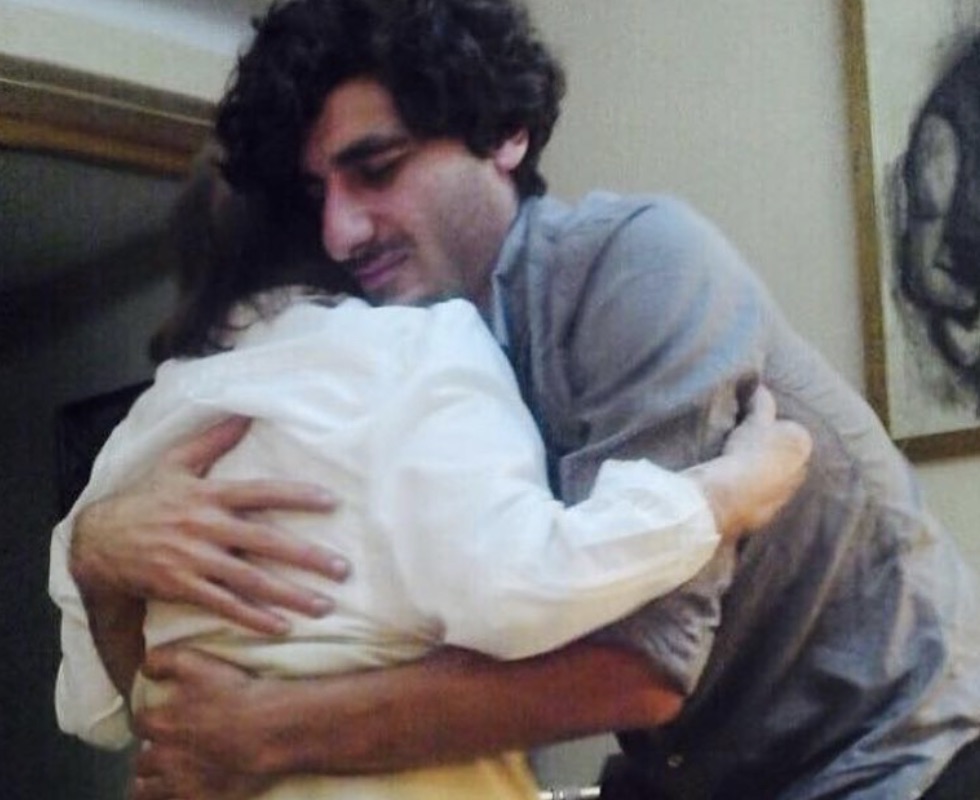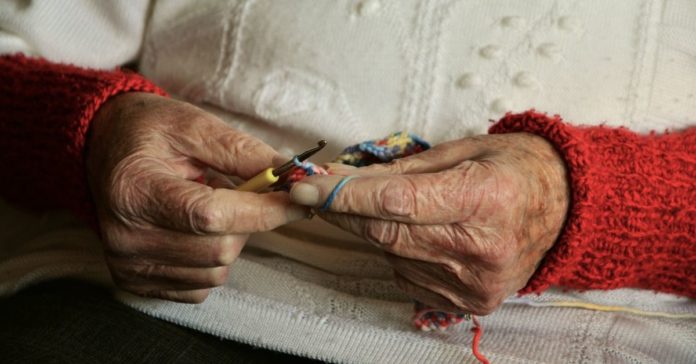When you are younger, the traditional familial structure involves an adult (parent, grandparent, aunt, uncle, guardian or all of the above) taking care of the younger generation. Typically kids are raised by adults. And then as you grow up and become self-reliant and independent in all aspects of life, you need your parents’ assistance and care less and less. But sometimes, instead of children growing up and preparing to raise their own families, the dynamic shifts in such a way that a role reversal takes place. Suddenly older family members need your help. They need care, they need support and they turn to you, their younger kin. This is especially true in Latinx families, where it’s common for the younger generation to step up and become the caregivers for their older relatives.
It’s not that you never see this role reversal and family dynamic within other ethnicities, but research is showing that more and more Latino Millennials are in charge of caring for their older kin, and this shift comes with its fair share of rewards and complications for everyone involved.
According to NPR, there are approximately 40 million people in the United States who are considered family caregivers, and of those millions of caretakers, 1 in 4 are Millennials. Meaning that there are about 10 million Americans between ages 18 and 34 currently caring for an older relative or loved one. And that number is significant within the Latino population a well — 27 percent of Millennial family caregivers are Hispanic/Latino, and more than half of Millennial caregivers are now people of color, according to a study conducted by the AARP Public Policy Institute.
These Latino Millennials are more likely than any other generation or ethnic minority to care for their aging relatives, and they are becoming an increasingly crucial part of the caregiving workforce, but their essential role in the well-being of their relatives does not come without certain sacrifices and struggles. There are several contributing factors leading to this shift in roles for Latino families, and in order to understand why Latino Millennials are becoming de facto caregivers, we need to understand a bit about the dynamic of Latino families as well as what these caregivers go through as they navigate their new life.
Why Latino Millennials Are More Likely to Become Caregivers
According to a 2016 Pew Research report, the number of multigenerational households in the U.S. increased to 20% of the U.S. population (about 64 million people), an all-time high. And that growth can be largely attributed to the rising population of Hispanics in the U.S. Among Hispanics living in the US, 27 percent lived with multiple generations of family members. That number is up from 23 percent in 2009.
In addition, more Latinos are aging and making up the senior demographic in this country.
According to the 2018 Population Estimates released by the U.S Census Bureau, from 2010 to 2018 the U.S. population’s median age increased by 2.2 years among the Hispanic population. This is a larger increase than any other ethnic group, with a 1.0-year average increase for the US population overall. Much of this aging increase can be attributed to the growth of the Hispanic population, and an increase in the 65 years and older population of baby boomers who are just now crossing over the senior threshold.
And in addition to the growing Hispanic senior population, we also have a growing population of Latino Millenials. According to the National Hispanic Council on Aging (NHCOA), “Hispanics are the youngest major racial or ethnic group in the United States. There are 24 million Hispanic Millennials in the country, accounting for almost half of the total U.S. Hispanic population,” based on data from the 2018 Status of Hispanic Older Adults: Insights from the Field – Reframing Aging Report.
And we also know that the majority of U.S. Hispanic Millennials (73%) serve as caregivers, in some capacity, to their aging parents, grandparents and other family members.
Latino Millennial Feel a Sense of Duty to Care for Relatives

So we know that there is an increasing population of Latino Millennials caring for their aging family members. We know that their support and care are needed, and they are stepping up to the plate to tend to the health needs of their kin and take on responsibilities with irreversible consequences should they falter. You could even argue that what these caregivers are taking on is well beyond what most Millennials are equipped to handle.
While many young adults in this country are off planning vacations, transitioning into new (or first) jobs, focusing on dating, exploring new cities, growing their careers and enjoying newfound independence, these Latino Millennials are juggling medication schedules, doctors appointments, meal plans, navigating the complicated healthcare system and helping to bathe, feed and tend to their relatives. So why are they doing this?
Many Latino caregivers acknowledge a culturally inspired sense of duty to their families and a deep desire to serve the people they love. According to Nicolas Peña, communications specialist for the National Hispanic Council on Aging, “taking care of a loved one in Latino culture is something that we find honor in: Taking care of the grandparents is not something I must do, but something that I want to do.”
It’s also a chance for younger Latinos to bond with their older relatives. For Millennials, connecting with and having a chance to spend quality time with those older family members is invaluable. For some of those families, it’s a chance to make up for lost time, as relatives often lived in different countries, or older relatives spent much of their time working hard to make ends meet and provide for their family members both in the US and back in their home country.
The Very Real Stresses of Being a Caregiver
Call it a familial obligation, a deep desire to reciprocate the care and love they received growing up, or a deep-rooted desire to embrace what time they have left with those family members, but more and more Latino Millennials are stepping into the role of caretaker, and it’s most certainly not an easy job.
Oftentimes serving as a caretaker requires more than just physical care. Many of these Hispanic caregivers are also helping to navigate the incredibly overwhelming and confusing healthcare system, while also helping to translate diagnoses and instructions from doctors, nurses and medical professionals as well as processing insurance information for their older relatives. Remember that in many cases these older Latino relatives do not speak fluent English, so they have extra obstacles when it comes to handling their medical needs.
Working as a caregiver to your aging relatives is hard work; in fact, Latino millennial family caregivers on average are helping their relatives more than 20 hours per week, the equivalent of a part-time job. Except this role is unpaid (because sadly gratitude and love don’t pay the bills), and many of these caregivers are also employed in other paid jobs simultaneously.
According to Jason Resendez, executive director of the Latinos Against Alzheimer’s Coalition, caring for older relatives as they deal with health issues and complicated healthcare burdens forces young caregivers “to grow up pretty quickly and be an advocate.”
While they are often helping and providing care out of a sense of obligation and honor, it is still a sacrifice and it does not come without its share of stresses. In order to care for relatives, many Millennials must cut back on their work hours, or struggle to juggle it all. Cutting back on work hours could have a potential impact on one’s career advancement, which could affect their long-term financial future. The stress of falling behind in one’s career can do serious damage to a person’s emotional state as well as his or her sense of financial stability. Plus the stress of caring for an aging relative with failing health is emotionally exhausting and can cause lasting distress.
Jean Accius, an expert on long-term care services at the AARP’s public policy institute, explains that Latino Millennials are at an increased risk of stress and pressure as they try to manage their role as caregivers and young adults. Because they often work more hours each week on average and spend more time providing care than young adults of other backgrounds the pressure can be even more intense, she explains.
Latinx Millennial Caregivers Work Hard to Achieve Balance in Their Role
As with so many roles, relationships and transitions in life, the key to successfully navigating the shift from child to the caregiver is balance. It’s not an easy task, but it’s an important part of making it work. “Many of these Millennials are not just working and providing this care, but are trying to figure out, ‘how do I balance all of this?’” says Accius.
Luckily, there are resources and organizations working to make the experience for millennial caregivers easier and more accessible. Caring Across Generations is a national initiative to transform the long-term health system in the U.S. This group is working to transform the way we provide care in this country and wants to make it easier for family caregiving to be recognized as a form of in-home care that’s eligible for financial subsidies from the state and count toward Social Security.
In addition, organizations such as the National Hispanic Council on Aging (NHCOA) are hosting roundtable events to create a national dialogue about the needs of millennial family caregivers. At the 2019 Caregiving Thought Leaders Roundtable, “Millennials: The New Face of Caregiving” in March of this year, Dr. Yanira Cruz, President and CEO of NHCOA, said “guilt plus anger and regret, is a dangerous mix for caregivers and these are the results when they don’t know how to manage things they cannot change.” She continued to explain, “this is why NHCOA has been constructing a path to connect to the real needs of caregivers. As we create the Academy for Caregivers, our intention is [to] create a special chapter focusing on Millennials.”
In addition, Leslie Sánchez, CBS News Political Contributor and Producer, and Former Director for the White House Initiative on Hispanic Education expressed a commitment to Millennials navigating their roles as family caregivers. “Today, our commitment is with Millennials, to contribute and identify their real needs as family caregivers, who not only take care of their loved ones but also take care of themselves.”
For Image credit or remove please email for immediate removal - info@belatina.com






































